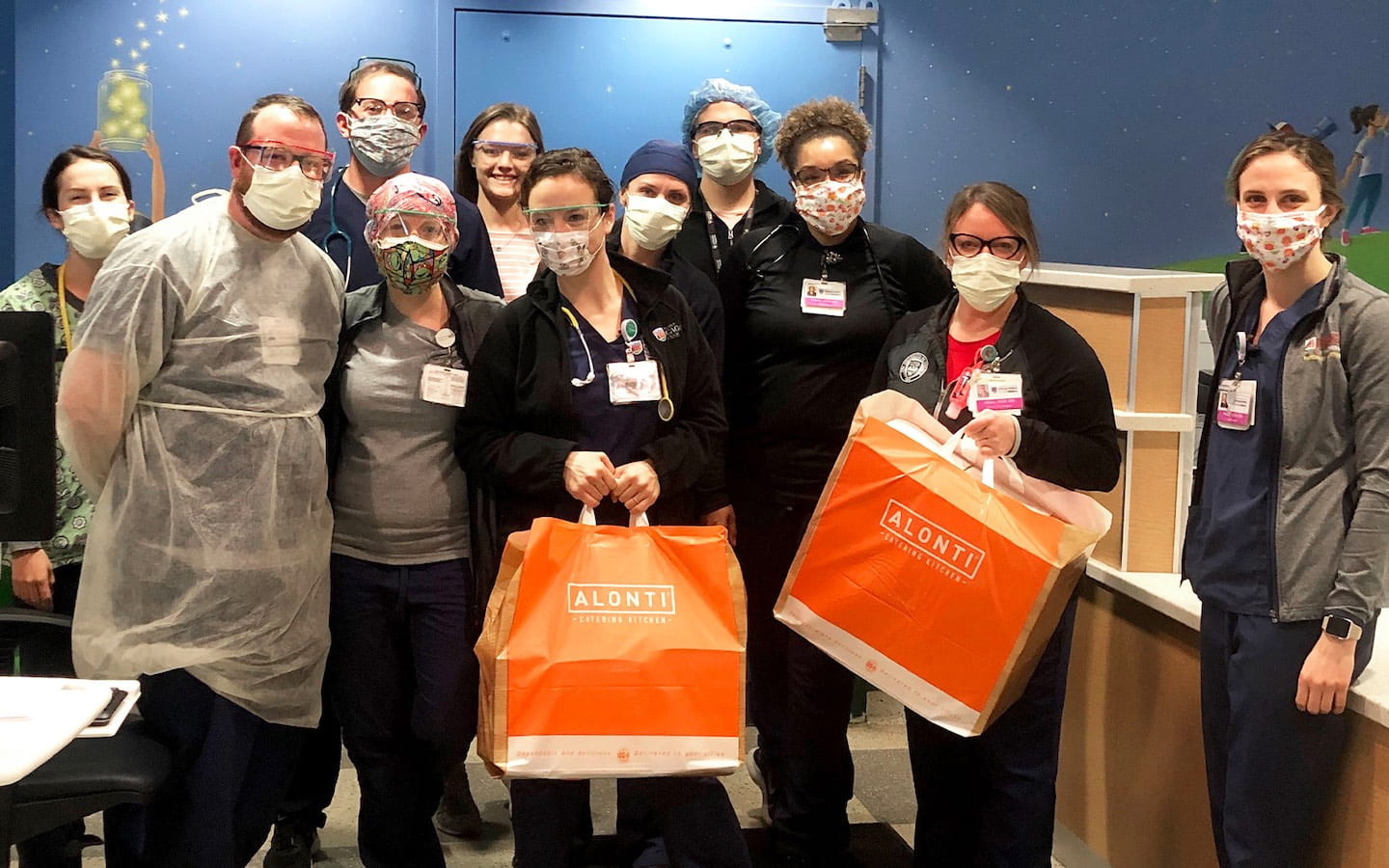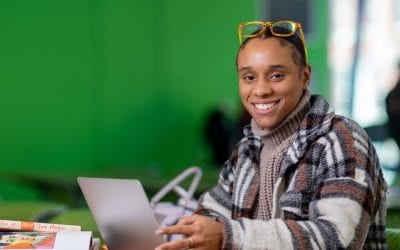Alumni on the Front Lines of the Pandemic
Local and Global Impactby Katy Cesarotti

On November 12, the United States quietly surpassed 150,000 new coronavirus cases a day. It’s a staggering number. It seems like years ago, not months, that people joked about stocking up on toilet paper or shared videos of quarantined people singing together from their balconies.
Throughout the past eight months, essential workers have continued to go to work on behalf of others: in schools, in hospitals, in the community. These Roosevelt University alumni shared what it’s like working on the front lines of COVID-19 and what gives them hope.
KINASHA BROWN
MA Secondary Education, ’07
Assistant Superintendent of Equity and Diversity at Tucson Unified School District

About 47,000 students attend school in Arizona’s Tucson Unified School District (TUSD). Like at districts across the country, the pandemic meant an unprecedented disruption in how kids learned, where their meals came from, how they spent their days.
Roosevelt alum Kinasha Brown says that at the beginning, TUSD was overwhelmed by the sharp transition.
“While we have not overcome all challenges, TUSD has made substantial progress in serving our families,” said the assistant superintendent. “That includes a herculean effort to close equity gaps exacerbated by the pandemic.”
Learning her “why”
Brown grew up on the Southeast Side of Chicago, in a neighborhood affectionately nicknamed South C.
“Like in many other economically depressed neighborhoods, there was high crime, extreme poverty and lack of communal resources,” Brown said. “But for all the trauma of living in the neighborhood, there was also a feeling of community and pride that still brings me peace today.”
In South C, Brown said, neighbors looked out for each other, and parents wanted better for their children.
She chose the Roosevelt master’s of secondary education program for its history and commitment to social justice. Brown knew the “iconic” African American figures who got their starts at Roosevelt: Chicago mayor Harold Washington; Congressman Bobby Rush; Earth, Wind & Fire founder Maurice White.
“As a woman who identifies and adores my African American roots, Roosevelt was the choice for me,” Brown said.
The alumna honed her educational philosophy as a graduate student in the secondary education program. She found opportunities to have a dialogue with her professors and her cohort, advocate for vulnerable populations, and appreciate diverse backgrounds and perspectives.
“I became astutely aware of who I wanted to be, not only as a teacher but as a person,” said Brown. “I learned my why.”
“I became astutely aware of who I wanted to be, not only as a teacher but as a person. I learned my why.”
— Kinasha Brown (MA ’07)
Serving families during the pandemic
Today, Brown says she has the privilege of leading a team where social justice and education intersect. In July, she relocated to Tucson, Arizona to take on her current role with the school district. Since then, she’s adopted a system-wide approach to magnet programs and developed a professional learning program in partnership with an Ivy League university.
When the nation’s schools lurched online in March, students faced wide digital and resource gaps. Many didn’t have reliable WiFi or computer access. During the 2019-20 academic year, about 1,200 students in the district experienced homelessness.
Brown says that her team’s equity-based framework for the transition created a roadmap to more fair remote learning.
To create “safe places” for students, the district set up learning centers where students could do their schoolwork. The Family and Community Engagement Department helped get meals, clothing and personal hygiene products to families under financial stress. The department also helped transport families to and from social service agencies.
The school district has four dedicated student services departments to address the specific needs of different student groups. Each led outreach to keep students engaged, support families with virtual tutoring, connect with community forums, and keep up college and career readiness activities.
“As a system, TUSD has remained committed to serving families and communities during this unprecedented time,” Brown said. “And all strategies to remedy the COVID-19 impact were done through the lens of equity.”
COURTNEY MAKOWSKI
PharmD ’16
Critical Care Pharmacist, Northwestern Memorial Hospital
Pharmacist Courtney Makowski works in the COVID-19 intensive care unit at one of the city’s largest academic medical centers. At Northwestern Memorial Hospital, critical care pharmacists are an essential part of the health care team for patients during the pandemic. As medication experts, they help enroll patients in clinical trials and individualize medications for each patient’s needs.
Makowski appeared on ABC-7 Chicago to talk about the treatment decisions and compassionate use trials of experimental therapies like remdesivir.
“There’s a lot that goes on behind the scene of a care team that most people are unaware of,” she said. “We definitely keep track to make sure that someone’s been assessed for a trial every single day.”
KEVIN REPPEN
BA Political Science, ’19
Preparedness Associate at Hagerty Consulting

Salt Lake County, Utah — a county with over 1.6 million residents, the economic and political heart of its state — saw its first confirmed case of COVID-19 on March 4. The next day, Roosevelt University alum Kevin Reppen deployed with Hagerty Consulting to join the county’s on-the-ground response team. Just weeks later, a 5.7 magnitude earthquake rattled the city.
Five steps ahead
Reppen spends his workdays reviewing data and trends, “trying to think five steps ahead” to gather the right information for leadership and plan what’s next in the response to a never-before-seen viral outbreak.
When the earthquake struck on March 18, Reppen was already developing of Continuity of Operations Plans – plans that lay out how an organization can operate when a disruptive emergency occurs – and assisted with the earthquake response while ensuring best practices for operating within a pandemic were being implemented.
“Roosevelt’s dedication to social justice was always a key element of my education — always teaching me to advocate for others, amplify others’ voices and speak up against injustice.”
— Kevin Reppen (BA ’19)

Kevin Reppen (front) discussing with his team at Hagerty Consulting
In his role as Deputy Intelligence Section Chief, Reppen gathered data to inform the county’s response. As summer turned into fall, Reppen helped facilitate workshops and training exercises so Salt Lake County would be prepared for a mass vaccine rollout.
His course work at Roosevelt University has helped him keep equity and inclusion at the center of his work.
“Roosevelt’s dedication to social justice was always a key element of my education,” said Reppen. “Always teaching me to advocate for others, amplify others’ voices and speak up against injustice.”
JOSE ALMANZA
BA Political Science ’19
Roosevelt University MPA Candidate

Almanza presents his poster at the 2019 McNair Scholars Symposium.
After serving in the Marine Corps, Jose Almanza Jr. came home to Chicago and moved into an apartment not far from his family in Little Village. Several leases and apartments later, he had seen firsthand how difficult gentrification has made it to live in his community.
Jose volunteers with Únete La Villita, a relatively new organization that promotes community-driven development in Little Village and North Lawndale.
Únete La Villita has distributed fruits, vegetables, hand sanitizer and face masks in Little Village. The Eviction Defense Team trained all summer to help Chicago tenants facing legal and illegal evictions during the pandemic. Read Jose’s full story.
NATALIE ERBES
BS Nursing, ’20
Registered Nurse, Northwestern Memorial Hospital

Natalie Erbes, a 2020 graduate and newly minted registered nurse, lives with her 82-year-old grandmother in Chicago. Back in March, when Erbes worked with her first coronavirus-positive patient, she made a call home. Since then, her grandmother has been staying with Erbes’ parents in Crystal Lake, and Erbes has been living alone as she goes into work.
“I think that’s the biggest challenge,” she said. “You don’t want to infect anybody else, especially if any of your family members are high risk.”
Erbes works in the cardiology unit at Northwestern Memorial Hospital. The coronavirus can be especially devastating for the patients Erbes sees, who are already dealing with cardiovascular problems. According to doctors at the hospital, patients who have high blood pressure, diabetes or heart disease are more likely to need a ventilator. That escalates the pressure to be as careful as possible to prevent the transmission of disease.
“I think that’s the biggest challenge. You don’t want to infect anybody else, especially if any of your family members are high risk.”
— Natalie Erbes, BS ’20

Natalie Erbes and Schaumburg Campus COO Mablene Krueger
Other high-risk patients, afraid of exposure to COVID-19, have avoided going to the emergency room with heart attack symptoms. This could escalate the urgency of her team’s interventions.
Becoming a nurse in a global health crisis
Erbes was doing an internship at Northwestern Memorial Hospital when the pandemic began. Those extra months of experience have made her feel more comfortable getting started in her full-time role.
“It felt like a really long orientation process,” she said of her internship. “I saw the changes already that the hospital was making. So I knew what to expect before actually going in.”
At RMUI, the small class sizes and close relationships helped Erbes feel connected and stay accountable in her classes. During the accelerated 2.5 year program, she took classes all year round, and felt prepared to dive right into a full-time schedule.
“There’s a couple of us working from my class and we all feel the same amount of preparedness,” Erbes said. “I think they really set us up for success.”
Erbes’s preparation hasn’t gone unnoticed. When Northwestern Memorial Hospital was going through the process of recertification for its magnet status, Erbes’ charge nurse recommended her to sit in on the meeting due to her accomplishments throughout orientation.
On the day shift
Natalie Erbes’s day begins at 5:45 a.m. She completes a self-assessment form on her phone to confirm she’s symptom-free, and makes her way through the designated staff entrance for a temperature check. Erbes receives a new mask, which she then wears for her whole 12-hour shift. Her shift started in the report room, getting organized and huddling with the team for a rundown on what happened the shift before.
Throughout a shift, she checks in on her patients, attending to their pain, monitoring urgent situations, giving medications and transporting patients to procedures. She works closely with the health care team of nurse practitioners and physician’s assistants on each patient plan.
The cardiology unit is in a spacious, renovated wing of the hospital. As more coronavirus patients came seeking treatment, the ICU took over the 51-bed unit and the cardiology team relocated to another, smaller space. The new layout created new difficulties as the nurses strove to social distance, but the team worked out a routine to keep their patients safe.
When she can’t spend time with her family, Erbes is grateful she can turn to her boyfriend (a current nursing student) and her new unit for support.
She advises current nursing students is to shadow other nurses before taking on the role themselves. “You’re not going to learn everything walking out of nursing school, but you’ll learn something new every day,” she said. “Just keep on learning. Everyone is there to help and teach you.”
JORI WEISSMAN
BS Hospitality Management, ’04
Catering Sales Manager at Alonti Catering

Jori Weissman (BS Hospitality Management, ’04) and her colleagues at Alonti Catering Kitchen hoped to make this National Nurses Week special for health care workers. Her team delivered over $3,600 in fresh meals to support frontline workers. The fund’s first allocation went to the hard-working respiratory department at Rush University Medical Center.
“If nurses ever needed positive reinforcement, right now is the time,” Weissman said. “You want to do anything you can to help these people who are helping others and putting their lives at risk, every single day.”

Workers from Alonti Catering delivering free meals to frontline health care workers
More in this section
Personifying DEI through determination and an open heart
If you want something done, give it to a busy person. That adage easily applies to Lyvette Medina Jones and her ability to juggle work and family with volunteering in her community.
A big change in tuition is brewing for the incoming class of 2023
A recent study by University of Chicago National Opinion Research Center revealed that Americans see the cost of education as the No. 1 barrier to completing a degree or beginning college.
A philosophical approach
In fall 2012, Roosevelt University’s Wabash Building opened — making history as the second tallest academic facility in the United States.



